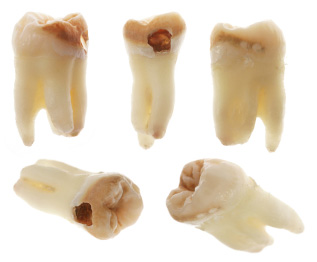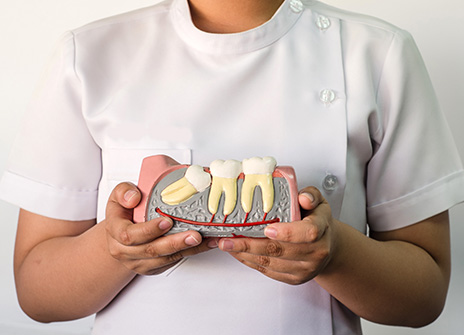Seven Toothache Causes & Solutions
-

A toothache should never be ignored. More often than not, people weigh the pain against the “inconvenience” of scheduling a dental appointment to determine the cause of the toothache and determine its severity. The issue with the “wait-and-see” approach is that it could turn a simple problem into something far more serious. For example, did you know that the sensation of pain in the left side of the jaw has been connected with heart attacks? Granted, this is the most serious scenario, but the fact of the matter is, there’s no reason to take an unnecessary chance. If you’ve experienced a chronic toothache, contact your dentist to set up an appointment as soon as possible.
There are a wide variety of causes of and solutions for toothaches. Here are seven of the most common…
-
Tooth Decay

Tooth decay is one of the most common culprits behind toothaches. The degenerative condition is caused by poor hygiene habits or dietary choices. The breakdown of tooth enamel associated with decay can lead to the development of holes in the teeth (cavities), which in turn can cause significant tooth pain.
Solution: Your dentist can remove the decay and restore the tooth with a simple dental filling. However, if not treated in time, the decay could spread to the nerve, leading to a more serious root canal procedure.
-
Crack/Fracture of the Tooth

A cracked or fractured tooth can result in significant tooth pain. Whether caused as a result of tooth decay, grinding (bruxism) or some sort of trauma, the end result is the same: pain.
Solution: If you crack or fracture your tooth, schedule an appointment with your dentist immediately. Aside from any pain you might be experiencing, failure to treat the issue promptly could result in further damage or infection. It could be the difference between saving your tooth or not. Depending on the severity of the crack or fracture, a dental filling, root canal, bonding, crown, veneer, bridge or implant may be needed to treat the issue and restore the tooth.
-
Teeth Grinding (Bruxism)

Do you grind your teeth at night? This common, unconscious habit is responsible for causing a far greater rate of enamel wear. This is a problem because as the enamel wears, it leaves the teeth susceptible to cracking and other oral health issues, which in turn can result in toothache. Bruxism can be traced to any number of causes; the most common are anxiety and stress, but just having an uneven bite can result in grinding.
Solution: Teeth grinding treatments vary depending on the source. For nighttime bruxers, a custom-fit bite plate may help to offset the effects of the unconscious grind. Other treatments can range from orthodontic treatment, stress reduction therapy and even muscle relaxants. Contact your dentist for a bruxism evaluation.
-
Impacted Wisdom Teeth

Wisdom teeth are the last to come in, meaning there often is little space left for them to fit into. As a result, many people experience impacted wisdom teeth, which in turn can cause serious jaw pain, swelling, and infection.
Solution: Wisdom teeth removal surgery is very common. Bleeding may be experienced for the first 24 hours after surgery, with full recovery taking between five to seven days. If you are experiencing chronic tooth pain and have not had your wisdom teeth removed, consult with your dentist to determine if they might be the cause.
-
Sensitivity

Tooth sensitivity is often the cause of that nagging tooth pain people experience from time to time. According to the Academy of General Dentistry, more than 45 million Americans experience some degree of tooth sensitivity. Typically associated with hot or cold foods/beverages, or even cold air hitting the teeth, sensitivity results from worn enamel.
Solution: Minor cases of tooth sensitivity may be easily managed with over-the-counter aids such as fluoride rinses, gels and toothpastes. Switching to a soft-bristled toothbrush might even be enough. More serious cases of sensitivity may require professional intervention through which desensitizers can be applied to the teeth.
-
Gum Recession

Recession of the gums refers to the degrading of gum tissue surrounding the teeth. As the tissue wears away with age or a result of poor hygiene practices, small pockets are created in the gum line. Bacteria can invade these pockets, affecting the teeth and causing serious problems. Gingivitis and gum disease are two common causes of recession. But it can also result from over-aggressive tooth brushing.
Solution: You cannot regrow gum tissue. The only way to treat gum recession effectively is through gum grafting. This involves taking gum tissue from a healthy section and grafting it to an affected area. Gum grafts are not cheap, so do your best to avoid this scenario.
-
Wear and Tear

Normal, everyday wear and tear is the cause of toothaches more often than not. As the teeth wear down naturally over time, the loss of enamel leads to a variety of issues ranging from uneven teeth to chipping and cracking. This in turn fosters an oral health situation that can result in toothache.
Solution: There are a variety of treatment options for wear and tear depending on the severity of the issue. Uneven surfaces can be fixed with composite materials, and chips and cracks can be bonded or filled. Speak with your dentist to determine the best solution to your toothache.









